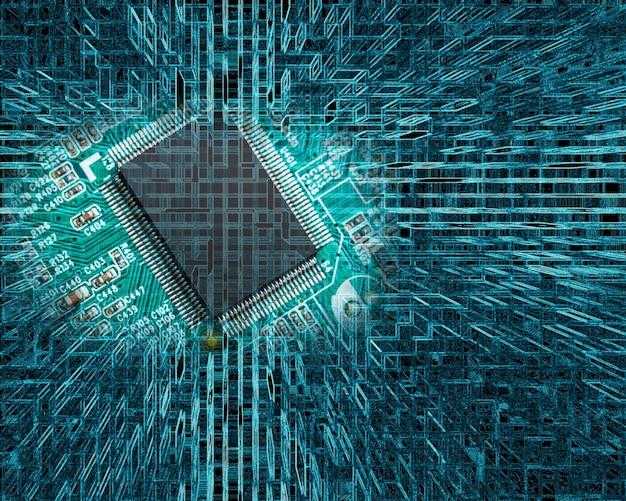The Impact of Quantum Computing on IC Chip Development
The Impact of Quantum Computing on IC Chip Development
Quantum computing (QC) is emerging as a game-changing technology. It has the full potential of revolutionizing different industries in the fields of technology and even beyond. We are already witnessing the results of quantum computing in various industries. It is utilized in the design, manufacturing, and optimization of different products. It also plays a role in the information-gathering or research stage before a product is manufactured.
The semiconductor industry is also witnessing the impact of quantum computing. It is used in different areas of chip development. The technology is poised to have an impact on the next generation of integrated circuits. In this article, we are going to discuss the impact of quantum computing on IC chip development. In case you are in the chip manufacturing industry, you will be able to appreciate various ways in which this technology is revolutionizing the industry.
What is the difference between quantum computing and classical computing?

Image source Austin Chronicle
When it comes to chip development, you may be wondering why quantum computing has a better advantage and not the classical or normal computing. The main difference between the two is in the way that they process information.
Data in classical computing is based on bits that are in the form of 0s and 1s. These two are a representation of the state of data. On the other hand, data in quantum computing exists in the form of qubits. They have a unique property known as superposition. Unlike bits that exist in mainly two states, qubits exist in multiple states. This is a major advantage as it allows quantum computers to process data on a wide range of values.
With classical computing, you can easily predict the expected outcome of the computing since data is in two definitive values. This is not the case for quantum computing. The multiple values and states of qubits only mean that you can rely on probability to predict the expected outcome of computing.
In classical computing, each bit has an independent state that is devoid of another state. The state of one bit does not have an impact on another state. This is not the case in quantum computing as the state of the qubits can be easily linked to each other.
With these differences, it is easy to tell why quantum computing is having a major impact on the chip development process. It gives developers a chance to explore unlimited possibilities.
Applications of Quantum Computing in IC development
Here are various ways in which computing is used in semiconductor chip development.
Optimization
Optimization is considered one of the greatest innovations of quantum computing in chip development. Quantum computers are perfectly designed to address various optimization issues during the semiconductor chip development process. This is because the technology is fully capable of addressing all the essential parameters of a semiconductor chip, including the details that classical computing can easily overlook.
With quantum computing, it is possible to optimize crucial parameters such as chip layouts, chip design, performance, thermal efficiency, power management, and many other areas. Quantum computers can analyze all these parameters simultaneously and produce a perfect design that will achieve the desired results.
For example, a quantum computer can establish an optimized routing and connection of electronic components on an integrated circuit. This routing will play a big role in ensuring that the chip is highly efficient and also economical.
Semiconductor security
Security is an important part of IC development. IC chip manufacturers need to ensure that they are building highly secure semiconductor chips. Quantum computing plays an important role in the development of secure chips. This is mainly done through cryptography.
Even though quantum computing is regarded as a threat to some existing cryptographic techniques, it enhances the strength of some cryptographic techniques. When these algorithms are embedded into hardware devices, they end up enhancing the overall security of the semiconductor development process.
Additionally, quantum computing helps in the generation of random numbers that are in turn used for securing the chip development process. Superposition and entanglement are important elements of quantum computing that play an important role in securing data and other components that are used in IC chip development.
Quantum computing in miniaturization
Miniaturization is an integral aspect of modern IC development. Its goal is to build small semiconductor chips. According the Moore’s Law, the number of transistors in an integrated circuit will keep doubling over the years. As this happens, the dimensions of transistors will keep getting smaller. Manufacturers have been striving to align their cheap development processes with this law.
Quantum computing has made it easier to develop smaller but denser integrated circuits. Quantum computing is used to analyze and simulate the I pact of building smaller chips. Using this technology, IC designers can come up with optimized designs. The computing technology also helps designers foresee issues that are likely to arise while trying to achieve miniaturization. The overall impact is the building of smaller and more reliable IC chips.
Research and development in IC chip development
Chip development starts with information gathering. Designers, developers, and programmers have to gather adequate information that they will use in the building of the semiconductor chips. Quantum computing has enhanced the ability and capacity to conduct research on various subjects, including those that are concerned with the development of semiconductor chips.
The technology is widely used for processing large datasets. It does this task faster than what classical computing can do. This means that researchers can get all the information that they need within a short time. Modern data centers and data warehouses are powered by quantum computing. Other than data processing, the technology enhances the security of these data centers.
Artificial intelligence and machine learning
AI and machine learning are also used in the development of IC chips. They reduce the load of human designers to build everything from scratch. Some AI modules are used in designing chips and also optimizing the designs. Some modules are capable of developing computer programs. Quantum computing is widely used in the development of AI and machine learning modules.
Quantum computing speeds up the development of machine learning algorithms that are eventually used in different areas of chip development. It results in the building of cleaner and more robust models that perform critical roles in the chip development process. It also optimizes the power and efficiency of the machine-learning models.
Challenges of quantum computing in IC chip development

Image source Freepik
Despite the power and capabilities of quantum computing in semiconductor chip development, various challenges are hindering the full optimization of this technology. Quantum decoherence is one of the biggest challenges that are affecting quantum computing.
Quantum decoherence occurs when quantum computers are exposed to unfavorable environmental conditions. This is a major issue because these computers are super sensitive to external conditions. A minor variation of the environmental condition will cause massive disruption to the state qubits. Temperature is one of the key factors that can cause devastating effects on the quantum computer. Electronic radiation is another major drawback of quantum computing.
External conditions tend to slow down the ability of the computer to perform quantum computation. The impact could lead to errors in quantum computation and this will end up affecting the accuracy of chip development. It may take massive resources and high levels of expertise to rectify the errors caused by quantum computers.
The good news is quantum chip designers are striving to develop qubit designs that are less susceptible to external conditions. They are also building computers that have mechanisms to shield the chips and the processors from external interference. For example, cryogenic cooling solutions have been built to shield quantum computers from the effects of drastic temperature variations.
Another way of addressing the challenges of quantum computers in chip development is the building of error correction techniques. These techniques are directly embedded into quantum chips that are in charge of executing quantum computation. The error-correction codes are capable of detecting and correcting errors in real-time. This helps to improve the overall reliability of quantum computing
Conclusion
Quantum computing has the full potential of revolutionizing semiconductor chip design and manufacturing to the next level. It is the future of IC chip development. The technology provides a wide range of solutions that solve the current hitches and drawbacks in chip development. The results will be high-performance chips that are embedded with numerous features such as security and high levels of reliability. The technology is also expected to accelerate the rate of semiconductor chip production.
So, what is your role in the IC chip development? Regardless of where you sit in the industry, there is a high chance that you are likely to gain the full benefits of QC. We all agree that quantum computing has improved the power, quality, and efficiency of semiconductor chips. You can only find these chips from reliable suppliers and distributors. Rantle East Electronic is one such distributor. We are a global distributor of quality semiconductor chips. Contact us in case you want to buy IC chips in bulk
Kevin Chen
Founder / Writer at Rantle East Electronic Trading Co.,Limited
I am Kevin Chen, I graduated from University of Electronic Science and Technology of China in 2000. I am an electrical and electronic engineer with 23 years of experience, in charge of writting content for ICRFQ. I am willing use my experiences to create reliable and necessary electronic information to help our readers. We welcome readers to engage with us on various topics related to electronics such as IC chips, Diode, Transistor, Module, Relay, opticalcoupler, Connectors etc. Please feel free to share your thoughts and questions on these subjects with us. We look forward to hearing from you!







 Start With
Start With Include With
Include With


